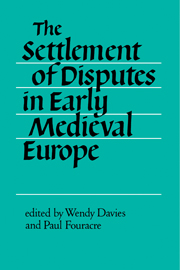Book contents
- Frontmatter
- Contents
- List of figures
- Preface
- Abbreviations
- Introduction
- 1 Disputes in late fifth- and sixth-century Gaul: some problems
- 2 ‘Placita’ and the settlement of disputes in later Merovingian Francia
- 3 Dispute settlement in Carolingian West Francia
- 4 People and places in dispute in ninth-century Brittany
- 5 Visigothic law and regional custom in disputes in early medieval Spain
- 6 Land disputes and their social framework in Lombard–Carolingian Italy, 700–900
- 7 Dispute settlement in the Byzantine provinces in the tenth century
- 8 Charters, law and the settlement of disputes in Anglo-Saxon England
- 9 Dispute settlement in medieval Ireland: a preliminary inquiry
- 10 An early modern postscript: the Sandlaw dispute, 1546
- Conclusion
- Appendix texts of the documents discussed
- Glossary
- List of works cited
- Index
3 - Dispute settlement in Carolingian West Francia
Published online by Cambridge University Press: 11 January 2010
- Frontmatter
- Contents
- List of figures
- Preface
- Abbreviations
- Introduction
- 1 Disputes in late fifth- and sixth-century Gaul: some problems
- 2 ‘Placita’ and the settlement of disputes in later Merovingian Francia
- 3 Dispute settlement in Carolingian West Francia
- 4 People and places in dispute in ninth-century Brittany
- 5 Visigothic law and regional custom in disputes in early medieval Spain
- 6 Land disputes and their social framework in Lombard–Carolingian Italy, 700–900
- 7 Dispute settlement in the Byzantine provinces in the tenth century
- 8 Charters, law and the settlement of disputes in Anglo-Saxon England
- 9 Dispute settlement in medieval Ireland: a preliminary inquiry
- 10 An early modern postscript: the Sandlaw dispute, 1546
- Conclusion
- Appendix texts of the documents discussed
- Glossary
- List of works cited
- Index
Summary
About the year 830, the monastery of St Benedict at Fleury was in dispute with another monastery over possession of some serfs. The abbot of Fleury, learning where and when the case was to be heard before the local vicarius, and ‘not wishing to be thought careless’, sent two monks to the vicarius with a gift of two silver bowls and a message begging him ‘to favour justice and righteousness’. Unfortunately for the abbot, the vicarius had already received presents from the other monastery, and thus ‘corrupted’ and ‘diverted from the righteousness of equity’, he spurned Fleury's offerings, ‘Go away, you monks, and take your bowls with you’. But St Benedict was watching over his community, and saw to it that the vicarious, in his pride, was thrown from his horse and killed. Thus Fleury's advocatus could have his case heard by different judges and settled by a ‘lawful judgement’ in Fleury's favour.
This case is typical in several ways of dispute settlement in Francia in the Carolingian period. It arose from the pursuit by a powerful lord of a property claim – the parties involved being saints, represented by monastic communities; the property, manpower; and the claim pursued through courts and judgements supported by the Carolingian régime. But the case is untypical in that it is recorded in a collection of miracle stories and reveals something of the social mechanisms as well as the legal procedures by which disputes were settled. Usually the evidence for dispute settlement survives in sources that are either prescriptive and normative (laws, formulae) or formal records of particular cases (charters, notitiae).
- Type
- Chapter
- Information
- The Settlement of Disputes in Early Medieval Europe , pp. 45 - 64Publisher: Cambridge University PressPrint publication year: 1986
- 27
- Cited by



